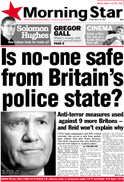 Is no-one safe from Britain’s police state?
Is no-one safe from Britain’s police state?
By Tom Mellen
Morning Star, 23 March 2007
CIVIL rights campaigners and MPs warned yesterday that no-one is safe from punishment without trial after Home Secretary John Reid announced that nine British citizens are now subject to “control orders.”
This means that half of all the 18 controversial orders that are currently in force are against British citizens, rather than foreign nationals. In comparison, in February last year, just one of the 18 orders in force was against a British citizen.
Control orders are a form of house arrest under which the liberty of the recipient is severely restricted upon an order made by the Home Secretary.
In a quarterly update to MPs, Mr Reid said that two new orders have been made against British citizens – one on December 11 and another on March 10. He also admitted that a terror suspect who absconded last summer is now thought to be overseas.
Labour leadership contender John McDonnell MP said: “When control orders were introduced, we warned that this measure was a ruse to detain people without trial. Now it is escalating. If there is evidence, these people should be brought to trial. If not, they must not be subject to control orders, which undermine the fundamental priniciple of habeas corpus, a key aspect of our legal system for centuries.”
A Campaign Against Criminalising Communities (CAMPACC) spokesman warned that Mr Reid’s announcement is a “grave warning that no-one is safe from punishment without trial and that the government is moving further towards a police state.”
Shadow home secretary David Davis stormed that control orders are “being used as a substitute for serious law enforcement and are ineffective as a means of public protection”.
“The government is resorting to using these ineffective control orders, even when they could be using evidence to prosecute and convict these people so that they can be properly imprisoned,” he said. “If the government deems a person to be a terror suspect dangerous enough to be held under an arbitrary form of house arrest, it is outrageous that they are not taking all available steps to prosecute, convict and imprison that individual.”
But the CAMPACC spokesman stressed that Mr Davis had accepted the assumption that control orders are necessary to prevent terrorist attacks in cases where available evidence is inadequate for a prosecution, while criticising the government for failure to prosecute.
“The use of such powers has nothing to do with public safety,” he insisted, noting that the July 7 2005 bombers “had been well known to the authorities as people likely to carry out a terrorist attack, yet, apparently, little was done to prevent this.”
“The government’s illogic should be turned upside-down,” he added. “Control orders are about creating more and more terror suspects, spreading a climate of fear and using the law as a political weapon, especially for terrorising Muslim and migrant communities.”
Unlock Democracy director Peter Facey said: “Control orders not only compromise those rights but appear to fail to even do the job that they are designed for. The fact that three individuals under control orders have absconded suggests fundamental problems with implementation. This needs to be addressed before giving the state such sweeping powers.”
A Respect spokesman agreed, saying: “It doesn’t take a rocket scientist to see that these people who have been deprived of their liberty are young Muslims. They would be prosecuted if there was a shred of evidence against them.”
